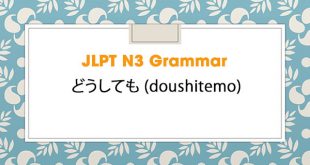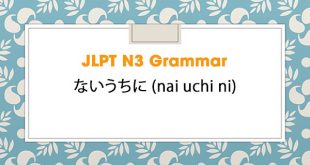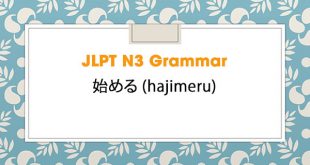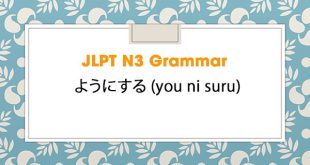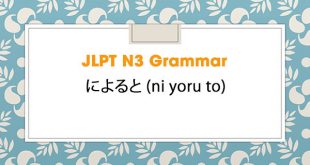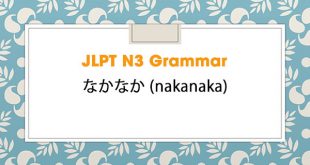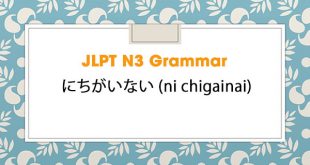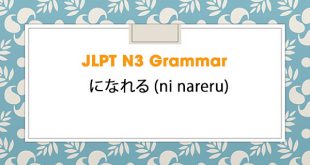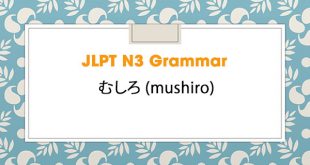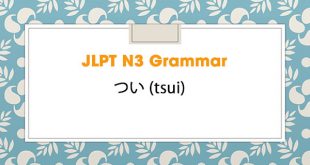どうしても (doushitemo) Meaning: no matter what, at any cost; after all How to use the: どうしても + Vますたい Example sentences: 1, 次に休みにはどしても北海道へ行きたい。 Tsugini yasumi ni wadoshite mo hokkaidō e ikitai. The next vacation I want to go to Hokkaido anyway 2, どうしてもできるだけ。 Doushitemo dekirudake. Either way, try your best 3, …
Read More »Grammar
JLPT N3 Grammar: ないうちに (nai uchi ni)
ないうちに (nai uchi ni) Meaning: before something happens Explain: Before …. doing something in the present state (before that present changes) Example sentences: 1, 暗くならないうちに買い物に行ってこよう。 Kuraku naranai uchi ni kaimono ni itte koyou. Let’s go shopping before it gets dark. 2, お母さんが帰ってこないうちに急いでプレゼントを隠した。 Okāsan ga kaettekonai uchi ni isoide purezento o …
Read More »JLPT N3 Grammar: はじめる~ (~始める) hajimeru (hajimeru)
はじめる~(~始める) hajimeru (hajimeru) Meaning: to start…; to begin to… How to use the: Verb-ますstem + 始める Explain: Shows the beginning of a certain event Example sentences: 1, 秋には葉が散る始めです。 Aki ni wa ha ga chiru hajimedesu. Leaves will begin to fall in the fall 2, 子供たちは6歳で小学校に行き始める Kodomo-tachi wa 6-sai de shōgakkō …
Read More »JLPT N3 Grammar: ようにする (you ni suru)
ようにする (you ni suru) Meaning: to try to; to make sure that; definitely do; try to do How to use the: Verb-dictionary form + ようにする Verb-ないform + ようにする Explain: Expression of meaning is determination, effort, self-restraint, to create behavior or situation Example sentences: 1, 必ず連絡をとるようにする。 Kanarazu renraku o toru you …
Read More »JLPT N3 Grammar: によると (ni yoru to)
によると (ni yoru to) Meaning: according to How to use the: Noun + によると Explain: Based on information sources, news to speculate and convey, the following sentence of commonly used sentences 「~そうだ」、「~ということだ」 Example sentences: 1, 天気予報によると、明日は雨が降るそうです。 Tenkeyohō ni yoru to, ashita wa amegafuru-sōdesu. According to the weather forecast, it will …
Read More »JLPT N3 Grammar: なかなか (nakanaka)
なかなか (nakanaka) Meaning: Forever but not yet, forever without ~ ; Quite Explain: Describe the state of the incident that was prolonged compared to expected Example sentences: 1, なかなか寝ています。 Nakanaka nete imasu. Still forever can not sleep 2, この果物はなかなか煮えない Kono kudamono wa nakanaka nienai This fruit forever but still unripe …
Read More »JLPT N3 Grammar: にちがいない (ni chigainai)
にちがいない (ni chigainai) Meaning: certainly; there is no doubt that ~. Explain: Use in affirmative statements about a fact Example sentences: 1, あそこにかかっている絵はすばらしい。値段も高いにちがいない。 Asoko ni kakatte iru e wa subarashī. Nedan mo takai ni chigainai. The picture over there is great. Surely the price is also expensive 2, 学生のゆううつそうな様子からすると、試験は難しかったにちがいない。 Gakusei …
Read More »JLPT N3 Grammar: になれる (ni nareru)
になれる (ni nareru) Meaning: to be used to…; become How to use the: Noun + になれる Example sentences: 1, 毎日日本語を勉強しているので日本語が上手になれました Mainichi nihongo o benkyō shite irunode nihongo ga jōzu ni naremashita Because study Japanese everyday then I think I will become good at Japanese 2, 彼女には教師になれるような力量はない Kanojo ni wa kyōshi …
Read More »JLPT N3 Grammar: むしろ (mushiro)
むしろ (mushiro) Meaning: rather; instead; better; (the contrary; the opposite) How to use the: むしろ + phrase Explain: Used to compare two events, showing which side has a higher level. Example sentences: 1, 彼女は親切?むしろ割りに気難しい。 Kanojo wa shinsetsu? Mushiro wari ni kimuzukashī. Is she that friendly? The opposite is very unapproachable …
Read More »JLPT N3 Grammar: つい (tsui)
つい (tsui) Meaning: Carelessly; by mistake; by accident Explain: Using expressive meanings means that will not be able to do it but you miss it because you cannot control yourself. Often used with the phrase 「Vてしまう」 Example sentences: 1, 今日は試験があったつい遅くなってしまった。 Kyō wa shiken ga atta tsui osoku natte shimatta. There …
Read More » Learn Japanese Free Learn Japanese Free
Learn Japanese Free Learn Japanese Free
